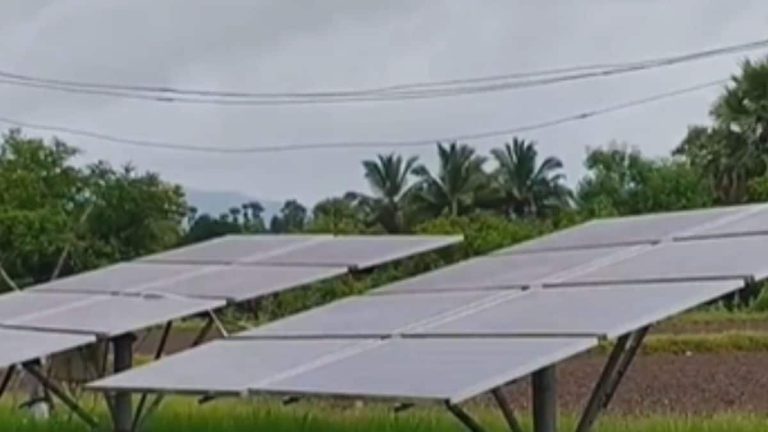Last updated:

Solar water pumps have become a sustainable solution.
A farmer named Srinivas explains to Local 18 why solar energy is beneficial and its advantages.
Farmers in the highlands of Andhra Pradesh's West Godavari district are increasingly using solar energy to supply water to their fields. They found it to be more reliable than traditional electricity, which can lead to lower crop yields due to its unpredictability. A farmer named Srinivas explains to Local 18 why solar energy is beneficial and its advantages. Agriculture's dependence on rainfall poses ongoing challenges due to a lack of reliable irrigation facilities, which in turn affects crop yields and farmer incomes. Solar water pumps have become a sustainable solution, providing a stable water supply. With falling costs and government subsidies, these pumps are becoming increasingly popular among farmers in the West Godavari highlands.
The pumps run on electricity generated by solar panels and require no diesel or grid power. This can result in significant cost savings as farmers avoid fuel or electricity charges and save Rs 15,000-20,000 per year, directly increasing their income. By ensuring a stable water supply, solar water pumps can increase crop yields, increase farming intensity, and increase overall agricultural productivity. Additionally, solar water pumps give farmers the confidence to irrigate their entire land, thereby increasing irrigation coverage. Improved irrigation can increase crop yields by 30-80%. Solar water pumps also support the planting of multiple crops within a year, allowing farmers to grow 2-3 crops on the same land, thereby increasing seasonal yields.
In institutions and hilly areas, the agricultural sector is undergoing a major transformation as farmers adopt solar energy to improve their farming practices. Traditionally, these areas have faced challenges such as limited power and water resources, which limits the number of crops that can be grown each year. With the adoption of solar energy, these limitations are being overcome, allowing farmers to achieve higher yields and grow up to three crops per year.
The use of solar energy is particularly beneficial in promoting the cultivation of a variety of crops, including vegetables, fruits and other commercially viable agricultural products. Solar irrigation systems enable farmers to maintain a steady water supply, even in remote and high-altitude areas where traditional irrigation methods are less efficient. This continuous water supply not only improves the quality of crops but also expands the types of crops that can be grown.
